高中英语牛津译林版 模块 4 Unit2 Sports events Grammar and usage情态动词 课件(共40张)
文档属性
| 名称 | 高中英语牛津译林版 模块 4 Unit2 Sports events Grammar and usage情态动词 课件(共40张) |
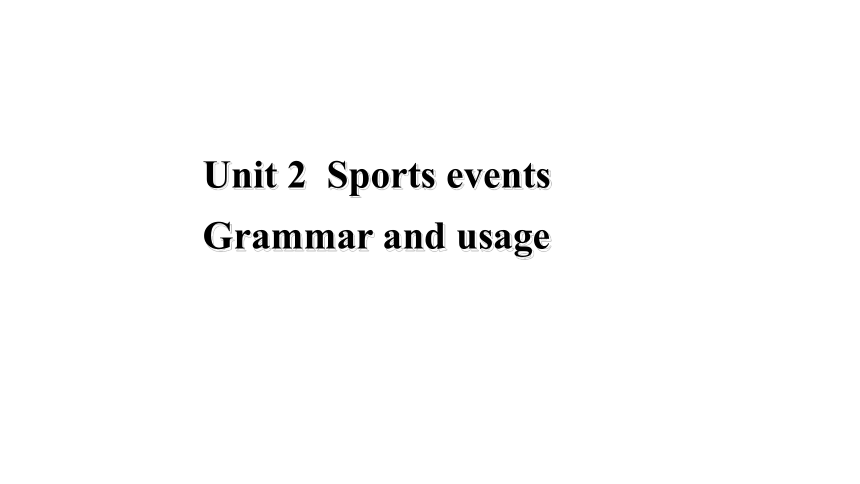
|
|
| 格式 | zip | ||
| 文件大小 | 184.3KB | ||
| 资源类型 | 教案 | ||
| 版本资源 | 牛津译林版 | ||
| 科目 | 英语 | ||
| 更新时间 | 2019-04-22 22:32:16 | ||
图片预览

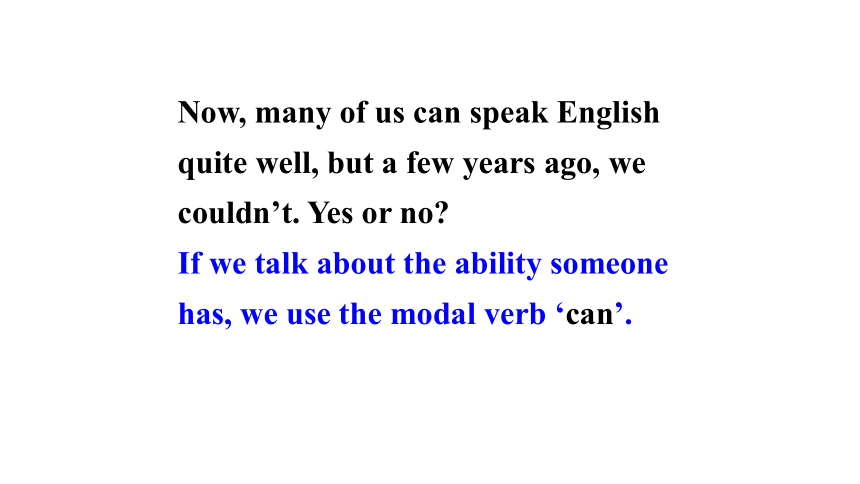
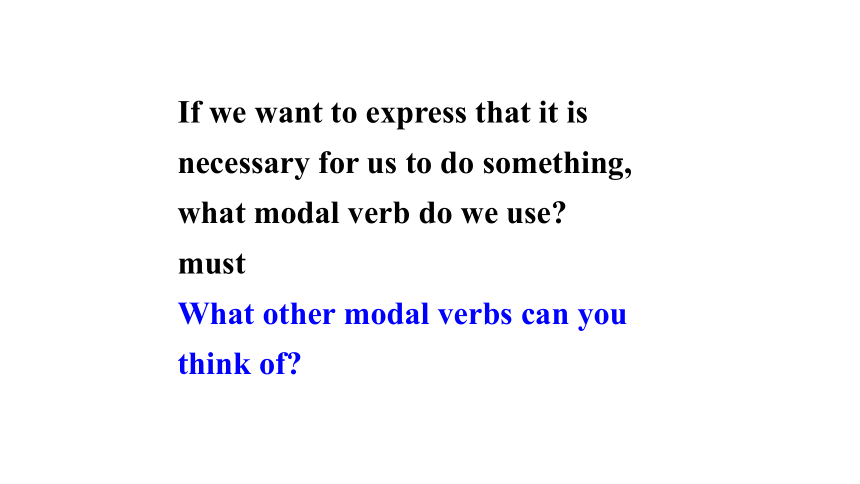
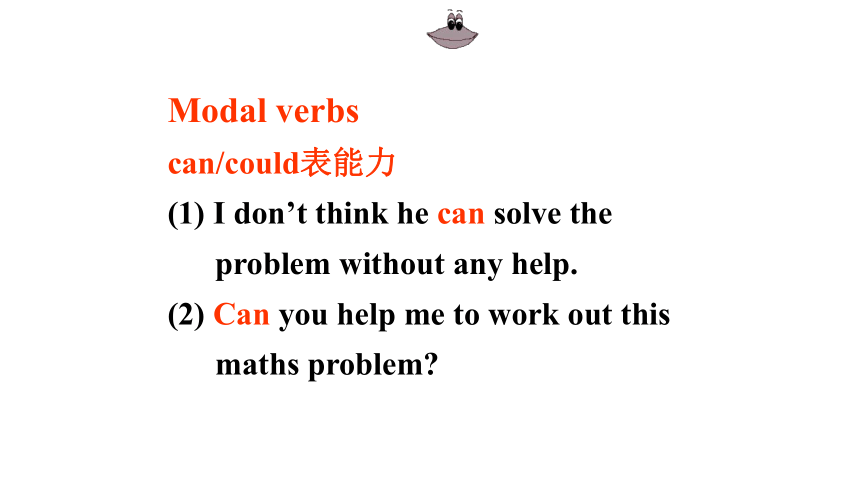
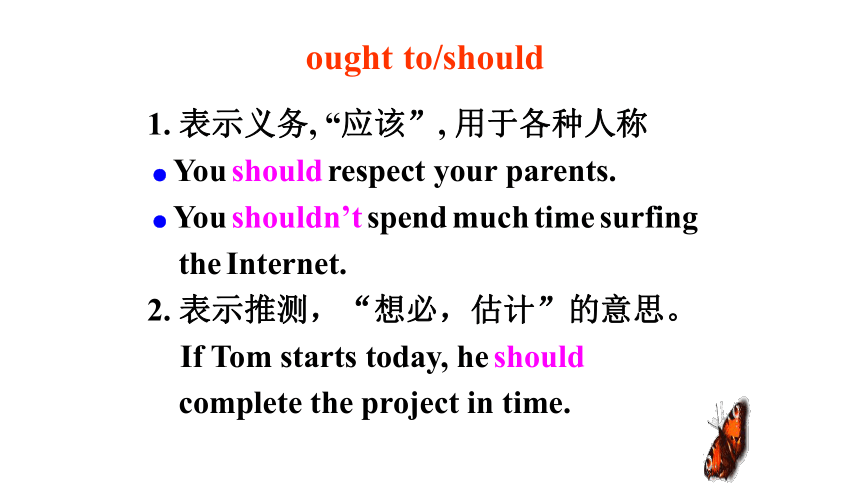
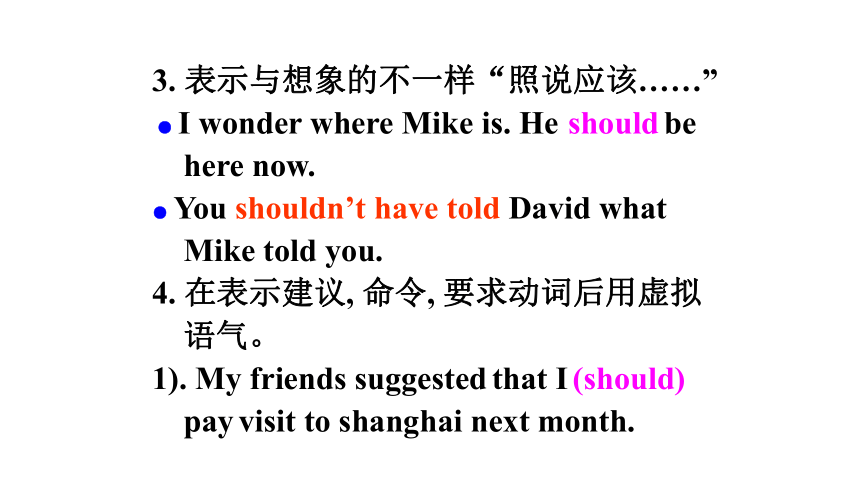
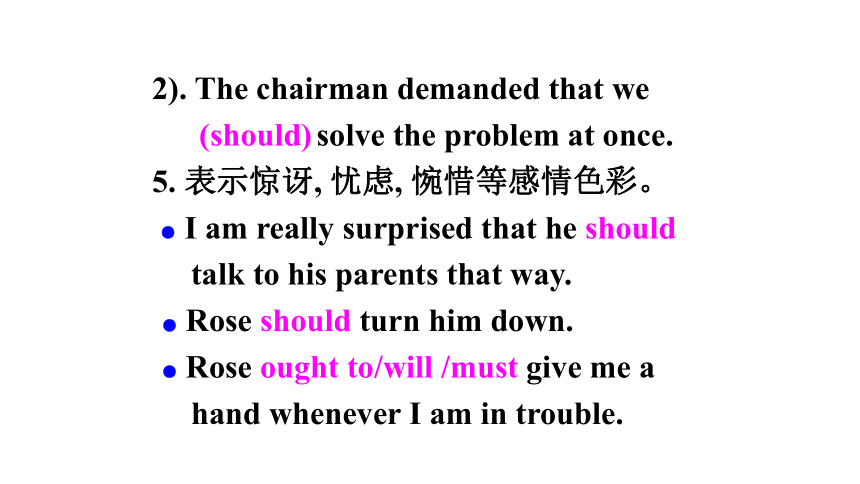
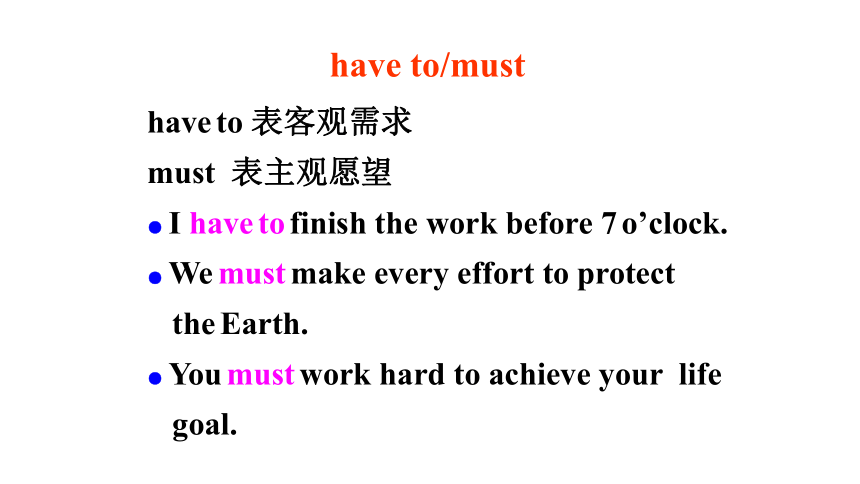
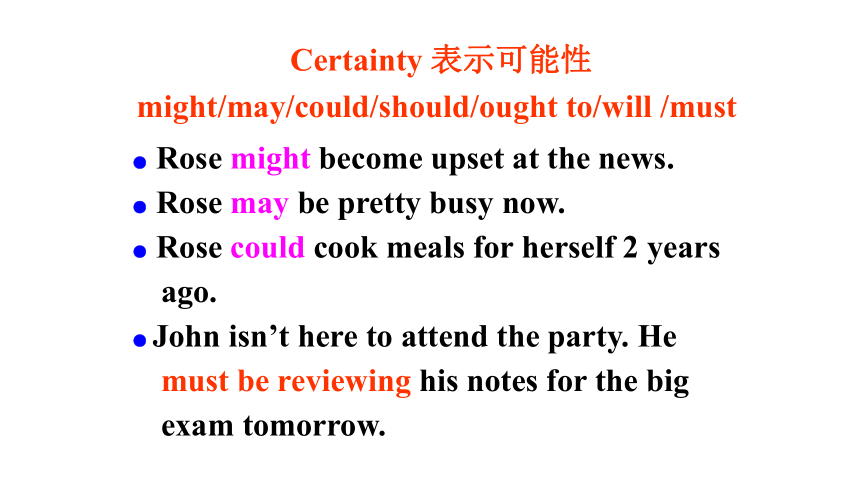
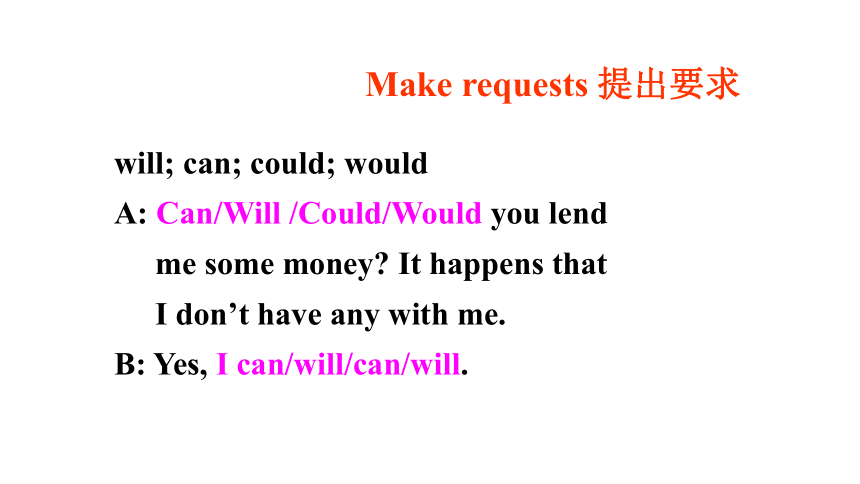
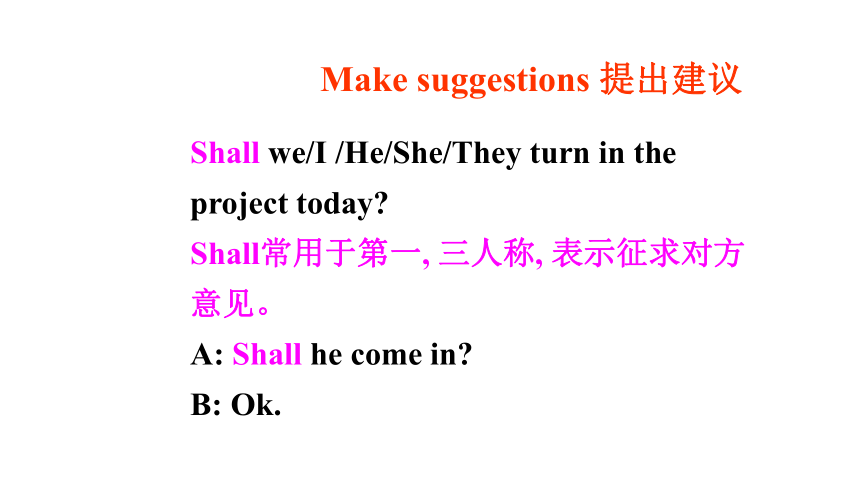
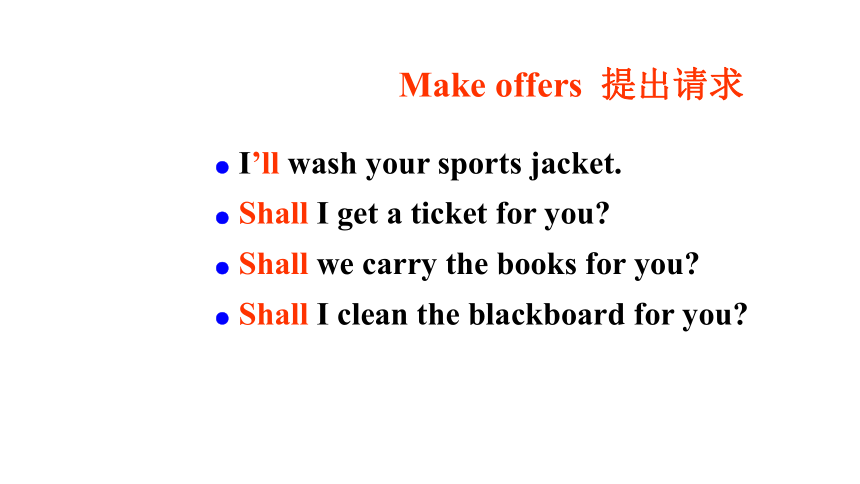
文档简介
课件40张PPT。Unit 2 Sports events
Grammar and usageNow, many of us can speak English quite well, but a few years ago, we couldn’t. Yes or no?
If we talk about the ability someone has, we use the modal verb ‘can’.If we want to express that it is necessary for us to do something, what modal verb do we use?
must
What other modal verbs can you think of?Modal verbs
can/could表能力
(1) I don’t think he can solve the problem without any help.
(2) Can you help me to work out this maths problem?ought to/should1. 表示义务, “应该”, 用于各种人称
● You should respect your parents.
● You shouldn’t spend much time surfing the Internet.
2. 表示推测,“想必,估计”的意思。
If Tom starts today, he should complete the project in time.3. 表示与想象的不一样“照说应该……”
● I wonder where Mike is. He should be here now.
● You shouldn’t have told David what Mike told you.
4. 在表示建议, 命令, 要求动词后用虚拟语气。
1). My friends suggested that I (should) pay visit to shanghai next month.2). The chairman demanded that we
(should) solve the problem at once.
5. 表示惊讶, 忧虑, 惋惜等感彩。
● I am really surprised that he should talk to his parents that way.
● Rose should turn him down.
● Rose ought to/will /must give me a hand whenever I am in trouble. have to/musthave to 表客观需求
must 表主观愿望
● I have to finish the work before 7 o’clock.
● We must make every effort to protect the Earth.
● You must work hard to achieve your life goal.● Rose might become upset at the news.
● Rose may be pretty busy now.
● Rose could cook meals for herself 2 years ago.
● John isn’t here to attend the party. He must be reviewing his notes for the big exam tomorrow.Certainty 表示可能性
might/may/could/should/ought to/will /mustMake requests 提出要求will; can; could; would
A: Can/Will /Could/Would you lend me some money? It happens that I don’t have any with me.
B: Yes, I can/will/can/will.Make suggestions 提出建议Shall we/I /He/She/They turn in the project today?
Shall常用于第一, 三人称, 表示征求对方意见。
A: Shall he come in?
B: Ok.Make offers 提出请求● I’ll wash your sports jacket.
● Shall I get a ticket for you?
● Shall we carry the books for you?
● Shall I clean the blackboard for you?Give advice 给出建议● You should not/ought not to speak to him like that.
● We should focus on our work.
● We should not laugh at those who are disabled.can/be able tocan的形式只有can; could两种
be able to的形式有am/is/are able to; was/were able to; have/has been able to等多种。can 一般指一个人的能力
be able to 经过努力后而达到的一定程度
● My brother can play table tennis.
● My brother is able to dive under water for 10 minutes.shall/ willshall表达诺言; will表示决心或决定
1) Take it easy. You shall be offered a job in this company.
2) Mike will spare no effort to study.mustn’t needn’tmustn’t “禁止, 不许”语气强烈
needn’t “不需要, 没有必要” 语气较
为缓和
1). You mustn’t miss the speech to be delivered tomorrow. It’s of great importance.2). You needn’t do that if you don’t want to.
3). Must we clean the classroom? Yes, you must. /No, you needn’t.
4). It is a five-minute walk from the station to my house. You needn’t have taken a taxi.
(However, you did take a taxi.)1. He can run the 100 m sprint in 11 seconds. [考点] can可以用来表示现在的或一般的能力。can在此句中意为“能”, 表示一般的能力。can还可以用来表示情况或事情在理论上或一般的可能性。考点点拨 考例回顾 [考例1] The biggest problem for most plants, which _____ just get up and run away when threatened, is that animals like to eat them. (湖南2007)
A. shan’t B. can’t C. needn’t D. mustn’t
[点拨] 句意:对绝大数受到威胁时而不能起身逃跑的植物来说, 最大的问题是动物喜欢吃它们。根据句意, 此处表示能力, 所以B项最佳。[考例2] Some aspects of a pilot’s job _____ be boring, and pilots often _____ work at inconvenient hours. (湖南2006)
A. can; have to B. may; can
C. have to; may D. ought to; must
[点拨] 句意:飞行员工作的某些方面可能是枯燥的, 而且他们经常得在不方便的时候工作。第一空用can表示情况或事情在理论上或一般的可能性。第二空表示客观上的必须, 故选A, 意为“不得不”。[考例3] My MP4 player isn’t in my bag. Where _____ I have put it? (福建2007)
A. can B. must C. should D. would
[点拨] 句意:我的MP4不在包里, 我会把它放在哪儿呢?表示猜测, 故选择A项。must have done表示关于过去的肯定的猜测;should have done表示本应该做却没有做;would have done用于虚拟语气。2. You must work hard to win the gold medal. [考点]must在此处意为“必须”。表示现在或将来必须做某事, 用must do sth.;表示现在或将来不必做某事时, 用don’t have to do sth.或don’t need to do sth.或needn’t do sth.。[考例1] In crowded places like airports and railway stations, you _____ take care of your luggage. (北京2007)
A. can B. may C. must D. will
[点拨] 句意:在像飞机场和火车站这样拥挤的地方, 你必须照看好你的行李。根据句意, 此处应为“必须”, 故选C。[考例2] —What do you think we can do for our aged parents?
—You ______ do anything except to be with them and be yourself. (重庆2007)
A. don’t have to B. oughtn’t to
C. mustn’t D. can’t
[点拨] don’t have to相当于needn’t, 意为“不需要”。故选A项。Have a try!
You are writing an article for the school magazine about how cities are chosen to host the Olympic Games. Go through the list showing what is important for a candidate city. Then use the information to complete the article.When choosing a city to host the Olympics, there are certain things we need to consider. First, the city (1) _____ (must, should) have an Olympic stadium and also (2) ______ (has to, ought to) provide first-class training grounds. The chosen city (3) ______ (must, should) also have plenty of good hotels and (4) _______ (could, must) have an international airport nearby. musthas toshouldmustPublic transport (5) _______ (has to, ought to) be convenient. Finally, we should think about the people who live in the city. Many of the people (6) _______ (should, might) speak at least a little English, which would be very helpful for tourists. ought toshouldZhou Jianping is interested in winter swimming and wants to practise it. He wrote a letter to his friend Li Ming, a winter swimmer, for advice. Help Li Ming complete his reply using modal verbs.Hi Jianping
I was glad to receive your letter and am happy to tell what I think about winter swimming.I know that you are a sports fan and like swimming very much. I’m pretty sure you (1) _____ swim very well. However, winter swimming (2) _________ be dangerous. I suggest you join a swimming club and learn from a coach. Reading a book on winter swimming will also be helpful.
Go swimming every day through summer and autumn. When winter comes, swim for just a few minutes at noon every day. cancan/couldDo some exercises as a preparation before you swim. Otherwise, you (3) ____________ hurt yourself.
To protect yourself from possible dangerous, you (4) ____________________ (not) drink before swimming. If the water is very cold, you (5) _____________________ (not) swim for too long.
When you go winter swimming, find a good place. may/might/couldmustn’t/shouldn’t/can’tmustn’t/shouldn’t/can’tIt’s important to find a place where you (6) ____ get in and out of the water easily.
Finally, you (7) _______ (not) be too worried. If you join a club and follow your coach’s advice, you will be a good winter swimmer very soon!
Yours
Li Mingcanneedn’tLi Tongtong is a new student. Her classmate Zhao Long offers to help her on her first day at school. Complete the following dialogue using shall or will.Zhao Long: Hi, Tongtong. Is there
anything I can do for you?
Li Tongtong: Oh, yes. I’d like to send a
postcard to my grandparents.
Where’s the post office?
Zhao Long: I’m going to the post office
after school. (1) ____ I post it for
you or (2) _____ we go together?
Li Tongtong: Let’s go together then.
Tomorrow is my birthday. (3)
____ you come to my birthday
party?Shall shallWill Zhao Long: Great! I’d love to. I (4)
_________ bring you a gift.
Li Tongtong: Thanks. Oh, by the way, I
don’t have many friends yet.
Would you like to bring your
friends too?
Zhao Long: That will be wonderful. I (5)
________ ask some friends to
join us. You (6) ____ have a good
time.
Li Tongtong: Thank you. will/ shallwill/shallwillPractice:
1.?— __?I?water?the?trees?on?Tuesday??? ?— No,?you?needn’t.? A.?Can? B.?Must? C.?May? D.?Shall?? 2.?He?_____?not?pay?unless?he?is?punished?
to?pay.?? A.?shall B.?will? C.?can? D.?would?? 3.?I?_____?such?a?mistake?again.?? A.?shall?never?make?B.?may?never?make?C.?can?never?do? D.?need? BAB4.?—_____?I?turn?on?the?radio??
You’d?better?not.?It?is?noisy?enough?in?this?room.? A.?Shall? B.?Must? C.?Need? D.?Do?
5.?Since?the?road?is?wet?this?morning,?_____?last?night.?? A.?it?must?rain? ? B.?it?must?have?rained?? C.?it?must?be?rained? D.?it?must?have?been?rained?? AB6.?Everyone?_____?do?his?best?to?make?the?world?safe?and?clean.?? A.?can? B.?may?C.?should? D.?had?to??
7.?They?_____?that?far;?but?they?stopped?to?have?a?snack?on?the?way.?? A.?might?be?gone? B.?needed?go?
C.?could?have?gone? D.?ought?have?gone
8.?You?_____?get?down?the?bus?until?the?
bus?has?stopped.?? A.?can’t? B.?needn’t?C.?mustn’t?D.?don’tCCDHomework:
1. Read the book.
2. Finish the exercises in the book.
3. Preview the Task part.
Grammar and usageNow, many of us can speak English quite well, but a few years ago, we couldn’t. Yes or no?
If we talk about the ability someone has, we use the modal verb ‘can’.If we want to express that it is necessary for us to do something, what modal verb do we use?
must
What other modal verbs can you think of?Modal verbs
can/could表能力
(1) I don’t think he can solve the problem without any help.
(2) Can you help me to work out this maths problem?ought to/should1. 表示义务, “应该”, 用于各种人称
● You should respect your parents.
● You shouldn’t spend much time surfing the Internet.
2. 表示推测,“想必,估计”的意思。
If Tom starts today, he should complete the project in time.3. 表示与想象的不一样“照说应该……”
● I wonder where Mike is. He should be here now.
● You shouldn’t have told David what Mike told you.
4. 在表示建议, 命令, 要求动词后用虚拟语气。
1). My friends suggested that I (should) pay visit to shanghai next month.2). The chairman demanded that we
(should) solve the problem at once.
5. 表示惊讶, 忧虑, 惋惜等感彩。
● I am really surprised that he should talk to his parents that way.
● Rose should turn him down.
● Rose ought to/will /must give me a hand whenever I am in trouble. have to/musthave to 表客观需求
must 表主观愿望
● I have to finish the work before 7 o’clock.
● We must make every effort to protect the Earth.
● You must work hard to achieve your life goal.● Rose might become upset at the news.
● Rose may be pretty busy now.
● Rose could cook meals for herself 2 years ago.
● John isn’t here to attend the party. He must be reviewing his notes for the big exam tomorrow.Certainty 表示可能性
might/may/could/should/ought to/will /mustMake requests 提出要求will; can; could; would
A: Can/Will /Could/Would you lend me some money? It happens that I don’t have any with me.
B: Yes, I can/will/can/will.Make suggestions 提出建议Shall we/I /He/She/They turn in the project today?
Shall常用于第一, 三人称, 表示征求对方意见。
A: Shall he come in?
B: Ok.Make offers 提出请求● I’ll wash your sports jacket.
● Shall I get a ticket for you?
● Shall we carry the books for you?
● Shall I clean the blackboard for you?Give advice 给出建议● You should not/ought not to speak to him like that.
● We should focus on our work.
● We should not laugh at those who are disabled.can/be able tocan的形式只有can; could两种
be able to的形式有am/is/are able to; was/were able to; have/has been able to等多种。can 一般指一个人的能力
be able to 经过努力后而达到的一定程度
● My brother can play table tennis.
● My brother is able to dive under water for 10 minutes.shall/ willshall表达诺言; will表示决心或决定
1) Take it easy. You shall be offered a job in this company.
2) Mike will spare no effort to study.mustn’t needn’tmustn’t “禁止, 不许”语气强烈
needn’t “不需要, 没有必要” 语气较
为缓和
1). You mustn’t miss the speech to be delivered tomorrow. It’s of great importance.2). You needn’t do that if you don’t want to.
3). Must we clean the classroom? Yes, you must. /No, you needn’t.
4). It is a five-minute walk from the station to my house. You needn’t have taken a taxi.
(However, you did take a taxi.)1. He can run the 100 m sprint in 11 seconds. [考点] can可以用来表示现在的或一般的能力。can在此句中意为“能”, 表示一般的能力。can还可以用来表示情况或事情在理论上或一般的可能性。考点点拨 考例回顾 [考例1] The biggest problem for most plants, which _____ just get up and run away when threatened, is that animals like to eat them. (湖南2007)
A. shan’t B. can’t C. needn’t D. mustn’t
[点拨] 句意:对绝大数受到威胁时而不能起身逃跑的植物来说, 最大的问题是动物喜欢吃它们。根据句意, 此处表示能力, 所以B项最佳。[考例2] Some aspects of a pilot’s job _____ be boring, and pilots often _____ work at inconvenient hours. (湖南2006)
A. can; have to B. may; can
C. have to; may D. ought to; must
[点拨] 句意:飞行员工作的某些方面可能是枯燥的, 而且他们经常得在不方便的时候工作。第一空用can表示情况或事情在理论上或一般的可能性。第二空表示客观上的必须, 故选A, 意为“不得不”。[考例3] My MP4 player isn’t in my bag. Where _____ I have put it? (福建2007)
A. can B. must C. should D. would
[点拨] 句意:我的MP4不在包里, 我会把它放在哪儿呢?表示猜测, 故选择A项。must have done表示关于过去的肯定的猜测;should have done表示本应该做却没有做;would have done用于虚拟语气。2. You must work hard to win the gold medal. [考点]must在此处意为“必须”。表示现在或将来必须做某事, 用must do sth.;表示现在或将来不必做某事时, 用don’t have to do sth.或don’t need to do sth.或needn’t do sth.。[考例1] In crowded places like airports and railway stations, you _____ take care of your luggage. (北京2007)
A. can B. may C. must D. will
[点拨] 句意:在像飞机场和火车站这样拥挤的地方, 你必须照看好你的行李。根据句意, 此处应为“必须”, 故选C。[考例2] —What do you think we can do for our aged parents?
—You ______ do anything except to be with them and be yourself. (重庆2007)
A. don’t have to B. oughtn’t to
C. mustn’t D. can’t
[点拨] don’t have to相当于needn’t, 意为“不需要”。故选A项。Have a try!
You are writing an article for the school magazine about how cities are chosen to host the Olympic Games. Go through the list showing what is important for a candidate city. Then use the information to complete the article.When choosing a city to host the Olympics, there are certain things we need to consider. First, the city (1) _____ (must, should) have an Olympic stadium and also (2) ______ (has to, ought to) provide first-class training grounds. The chosen city (3) ______ (must, should) also have plenty of good hotels and (4) _______ (could, must) have an international airport nearby. musthas toshouldmustPublic transport (5) _______ (has to, ought to) be convenient. Finally, we should think about the people who live in the city. Many of the people (6) _______ (should, might) speak at least a little English, which would be very helpful for tourists. ought toshouldZhou Jianping is interested in winter swimming and wants to practise it. He wrote a letter to his friend Li Ming, a winter swimmer, for advice. Help Li Ming complete his reply using modal verbs.Hi Jianping
I was glad to receive your letter and am happy to tell what I think about winter swimming.I know that you are a sports fan and like swimming very much. I’m pretty sure you (1) _____ swim very well. However, winter swimming (2) _________ be dangerous. I suggest you join a swimming club and learn from a coach. Reading a book on winter swimming will also be helpful.
Go swimming every day through summer and autumn. When winter comes, swim for just a few minutes at noon every day. cancan/couldDo some exercises as a preparation before you swim. Otherwise, you (3) ____________ hurt yourself.
To protect yourself from possible dangerous, you (4) ____________________ (not) drink before swimming. If the water is very cold, you (5) _____________________ (not) swim for too long.
When you go winter swimming, find a good place. may/might/couldmustn’t/shouldn’t/can’tmustn’t/shouldn’t/can’tIt’s important to find a place where you (6) ____ get in and out of the water easily.
Finally, you (7) _______ (not) be too worried. If you join a club and follow your coach’s advice, you will be a good winter swimmer very soon!
Yours
Li Mingcanneedn’tLi Tongtong is a new student. Her classmate Zhao Long offers to help her on her first day at school. Complete the following dialogue using shall or will.Zhao Long: Hi, Tongtong. Is there
anything I can do for you?
Li Tongtong: Oh, yes. I’d like to send a
postcard to my grandparents.
Where’s the post office?
Zhao Long: I’m going to the post office
after school. (1) ____ I post it for
you or (2) _____ we go together?
Li Tongtong: Let’s go together then.
Tomorrow is my birthday. (3)
____ you come to my birthday
party?Shall shallWill Zhao Long: Great! I’d love to. I (4)
_________ bring you a gift.
Li Tongtong: Thanks. Oh, by the way, I
don’t have many friends yet.
Would you like to bring your
friends too?
Zhao Long: That will be wonderful. I (5)
________ ask some friends to
join us. You (6) ____ have a good
time.
Li Tongtong: Thank you. will/ shallwill/shallwillPractice:
1.?— __?I?water?the?trees?on?Tuesday??? ?— No,?you?needn’t.? A.?Can? B.?Must? C.?May? D.?Shall?? 2.?He?_____?not?pay?unless?he?is?punished?
to?pay.?? A.?shall B.?will? C.?can? D.?would?? 3.?I?_____?such?a?mistake?again.?? A.?shall?never?make?B.?may?never?make?C.?can?never?do? D.?need? BAB4.?—_____?I?turn?on?the?radio??
You’d?better?not.?It?is?noisy?enough?in?this?room.? A.?Shall? B.?Must? C.?Need? D.?Do?
5.?Since?the?road?is?wet?this?morning,?_____?last?night.?? A.?it?must?rain? ? B.?it?must?have?rained?? C.?it?must?be?rained? D.?it?must?have?been?rained?? AB6.?Everyone?_____?do?his?best?to?make?the?world?safe?and?clean.?? A.?can? B.?may?C.?should? D.?had?to??
7.?They?_____?that?far;?but?they?stopped?to?have?a?snack?on?the?way.?? A.?might?be?gone? B.?needed?go?
C.?could?have?gone? D.?ought?have?gone
8.?You?_____?get?down?the?bus?until?the?
bus?has?stopped.?? A.?can’t? B.?needn’t?C.?mustn’t?D.?don’tCCDHomework:
1. Read the book.
2. Finish the exercises in the book.
3. Preview the Task part.
